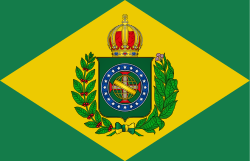This article needs additional citations for verification .(February 2024) |
| 1876 in Brazil |
|---|
| Flag |
 20 stars (1871–89) |
| Timeline of Brazilian history |
| Empire of Brazil |
| Year of Constitution: 1824 |
Events in the year 1876 in Brazil .
This article needs additional citations for verification .(February 2024) |
| 1876 in Brazil |
|---|
| Flag |
 20 stars (1871–89) |
| Timeline of Brazilian history |
| Empire of Brazil |
| Year of Constitution: 1824 |
Events in the year 1876 in Brazil .
28 April - Francisco, a slave, becomes the last person to be executed in Brazil, after murdering his masters, being hanged in Pilar, Alagoas.